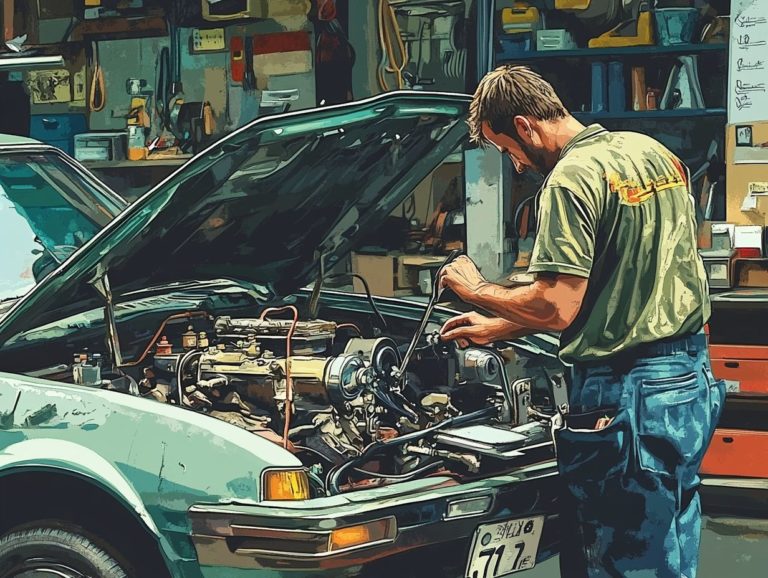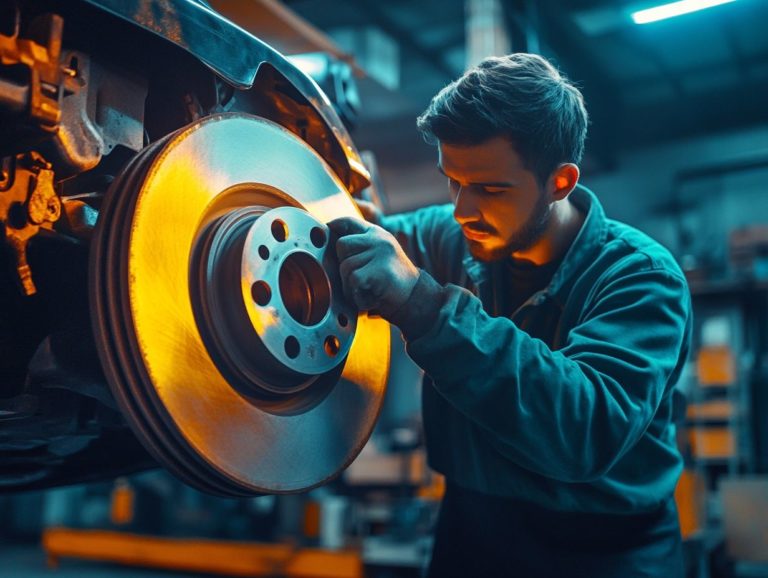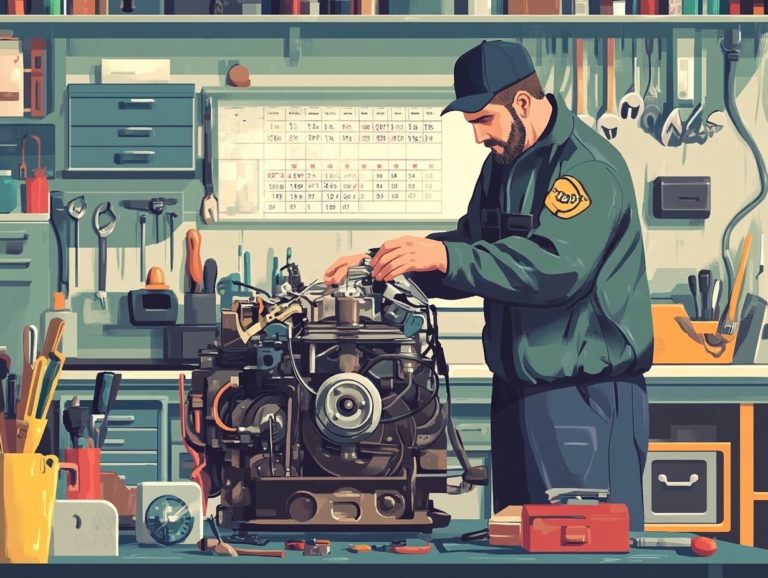5 Common Car Maintenance Mistakes to Avoid
Maintaining your car might seem daunting, but it s crucial for ensuring your vehicle runs smoothly and safely.
Many drivers inadvertently fall into common traps that can result in expensive repairs and reduced performance.
This article highlights five major car maintenance pitfalls you should avoid, from neglecting those all-important oil changes to overlooking warning lights.
It also emphasizes the necessity of regular upkeep, outlines how often you should service your vehicle, and explores the benefits of being proactive in your maintenance routine.
By keeping your car in prime condition, you ll not only enhance its performance but also ensure a safer driving experience.
Contents
Key Takeaways:
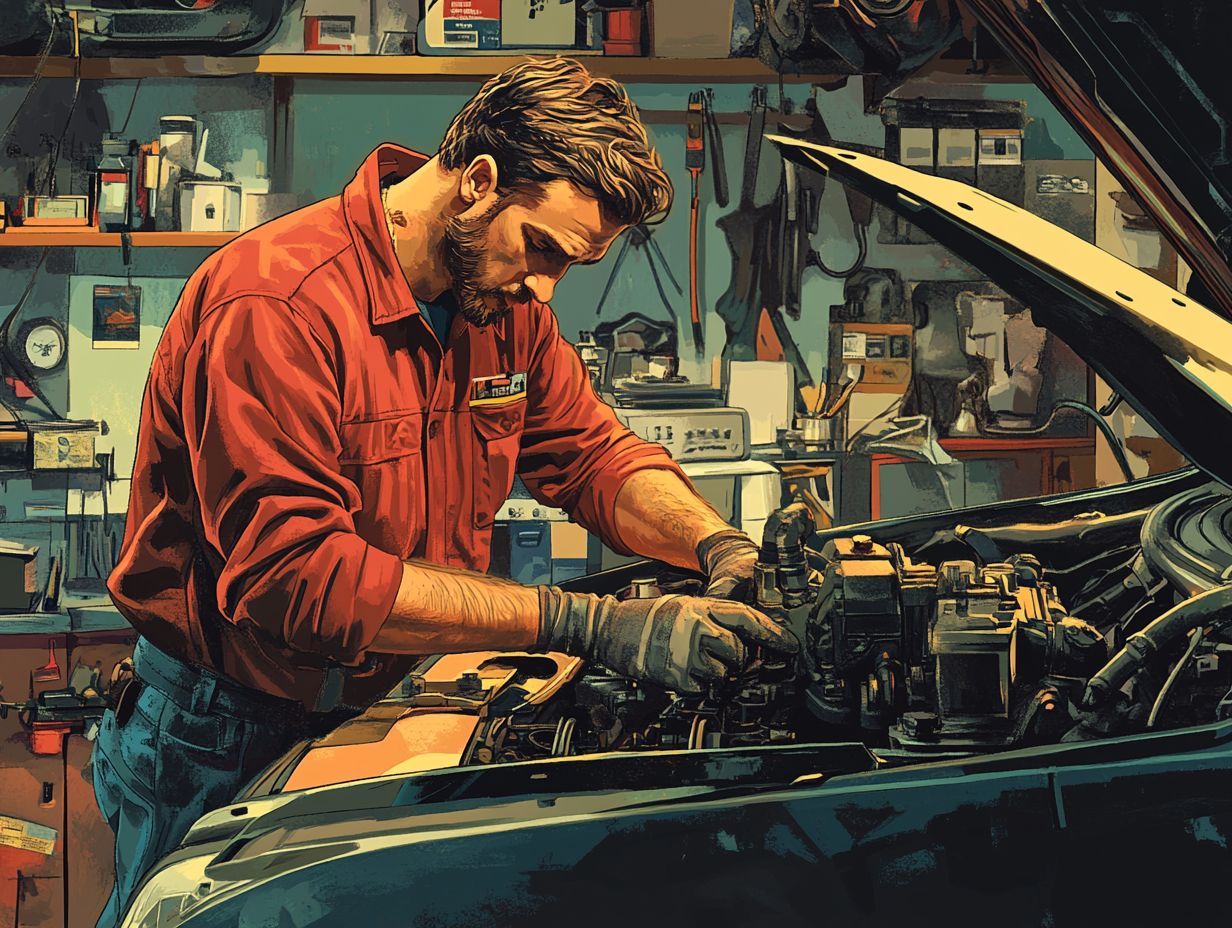
- Regular oil changes are crucial for a car’s longevity and performance.
- Checking tire pressure regularly can save you from accidents and costly repairs.
- Ignoring warning lights can lead to major car malfunctions and costly repairs.
1. Neglecting Regular Oil Changes
Neglecting regular oil changes is one of the most detrimental maintenance mistakes new car owners make. To avoid this, it’s crucial to be aware of common maintenance mistakes that can directly affect your engine’s performance and longevity.
This oversight not only heightens the risk of major repairs but also diminishes your fuel economy over time.
As time goes on, the oil becomes contaminated with dirt and debris. This leads to increased engine wear and potential mechanical faults that could require costly fixes.
Be sure to check your owner s manual to determine the optimal oil change intervals. These can differ based on the make and model of your vehicle. Some cars, particularly sports cars or older vehicles, may need more frequent changes.
Opting for high-quality oil and filters is crucial. Using inferior products can jeopardize your engine s health by failing to provide adequate lubrication for its components.
By regularly monitoring your oil levels and scheduling changes promptly, you can save yourself a substantial amount in repairs down the line.
2. Not Checking Tire Pressure Regularly
Regularly checking your tire pressure is essential for effective tire maintenance. When tires are improperly inflated, you risk decreased fuel economy, compromised road safety, and uneven wear.
To maintain the recommended tire pressure, refer to the guide found on the driver s side door jamb or in your owner s manual.
Make it a habit to check your tire pressure at least once a month and before embarking on long trips. Remember, temperature fluctuations can affect pressure, changing it by about one PSI (pounds per square inch) for every ten degrees Fahrenheit.
Incorporating tire rotation into your maintenance routine is equally vital for promoting even tread wear. Regularly inspecting the tread depth can help prevent potential blowouts and enhance traction, reflecting your commitment to safe driving.
3. Ignoring Warning Lights
Don’t ignore those warning lights on your dashboard! Ignoring them, like the check engine light, can lead to serious mechanical issues and expensive repairs.
It s crucial for you to address any car symptoms promptly.
By staying alert and understanding what these alerts mean, you can save yourself money and ensure your safety on the road.
When those warning lights come on, it’s essential to approach a mechanic equipped with specific details about any unusual sounds or changes in your vehicle s performance.
Common alerts to watch for include:
- The oil pressure warning, which could indicate low oil levels.
- The battery warning light, signaling potential electrical issues.
Neglecting these signals can cause more extensive damage over time. Clear communication with your mechanic will help facilitate quicker diagnostics and repairs.
4. Skipping Routine Inspections and Maintenance
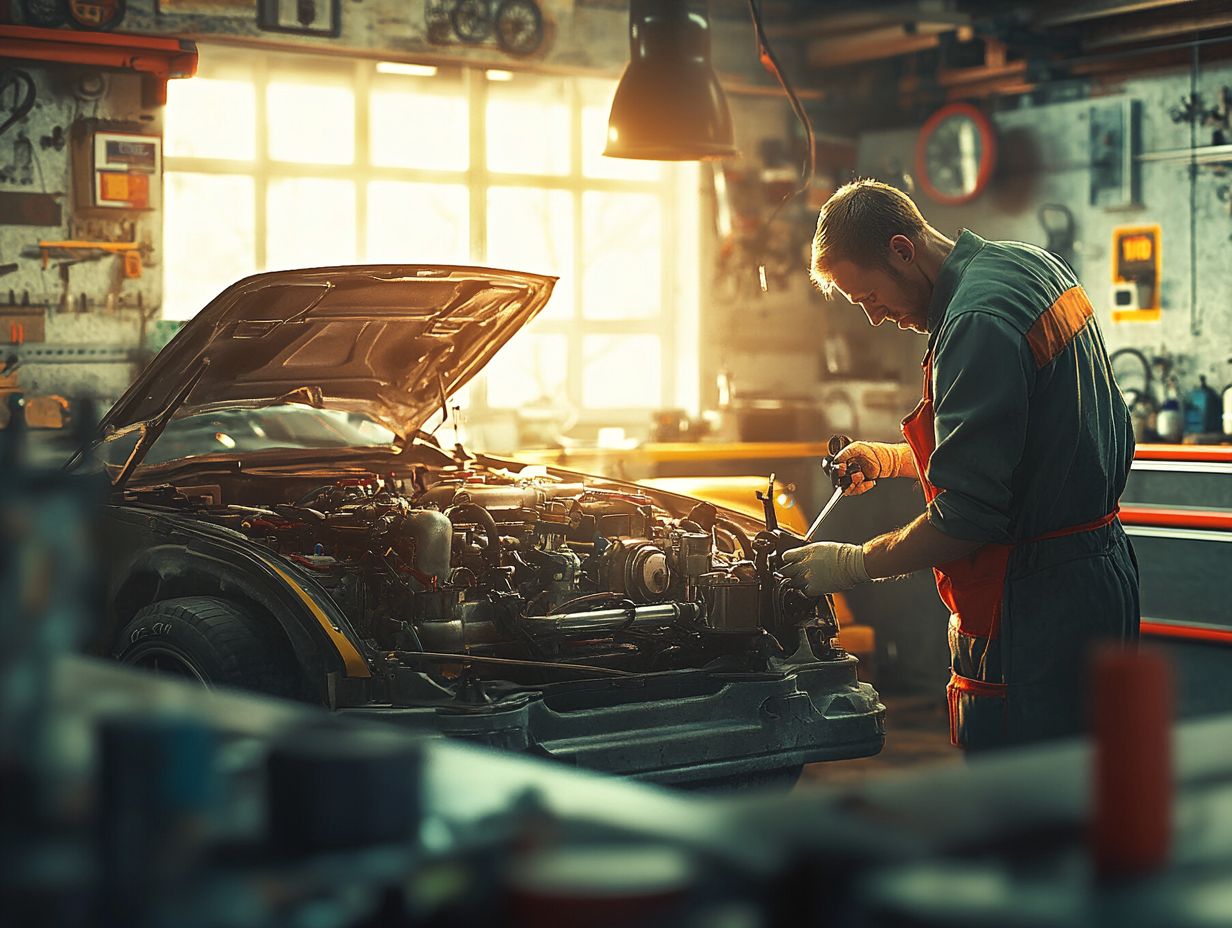
Many car owners skip routine inspections and maintenance, often falling for common myths about car maintenance. This neglect can lead to significant mechanical issues and unexpected repair expenses.
A well-planned maintenance schedule is essential. Key checks, such as brake inspections, fluid assessments, and wiper blade replacements, are crucial for your vehicle s performance and safety.
Regular brake inspections can catch wear and tear that may lead to dangerous situations. Keeping an eye on essential fluids like oil and coolant ensures your engine runs efficiently.
Don’t forget about wiper blades; timely replacement improves visibility during bad weather. By visiting an independent auto shop or consulting an ASE-certified technician, you gain expert service and peace of mind.
5. Using Incorrect or Low-Quality Parts
Using the wrong or low-quality parts can undermine your vehicle’s performance and safety. This oversight can lead to major repairs that were easily avoidable.
The choice of parts is very important for vehicle maintenance. High-quality components, especially Original Equipment Manufacturer (OEM) parts, ensure that each system operates correctly and enhances longevity.
Choosing cheaper, inferior alternatives may seem like a savings opportunity but often results in accelerated wear and increased repair costs. The risks of subpar parts can be serious, ranging from poor fuel efficiency to safety hazards.
Prioritize quality in all maintenance tasks to safeguard your vehicle and ensure optimal performance.
Why Is Proper Car Maintenance Important?
Proper car maintenance is vital for optimal vehicle performance and safety. Additionally, avoiding common mistakes in car leasing can further extend your vehicle’s lifespan, minimize repair costs, and enhance fuel efficiency.
Regular inspections should be the cornerstone of your car upkeep. They allow you to identify issues like worn brake pads or low fluid levels before they escalate.
Addressing repairs in a timely manner keeps systems running smoothly and reduces unexpected breakdowns. A structured maintenance schedule tailored to your vehicle keeps you proactive.
This proactive approach translates into peace of mind. Enjoy a more reliable driving experience, allowing you to navigate the road with confidence!
What Are the Consequences of Neglecting Car Maintenance?
Neglecting car maintenance can lead to mechanical issues requiring costly repairs. To avoid this, consider these 5 tips for avoiding common car repairs, which can help ensure both your safety and driving experience.
For instance, skipping regular oil changes can cause engine wear and overheating, potentially leading to catastrophic failure. Additionally, ignoring tire rotations can result in uneven wear and jeopardize traction. To avoid these issues, consider following essential maintenance tips for new cars.
Overlooking fluid checks can lead to serious problems like brake failure or transmission issues. Minor oversights can snowball into financial strain and an unreliable vehicle.
How Often Should a Car Be Serviced?
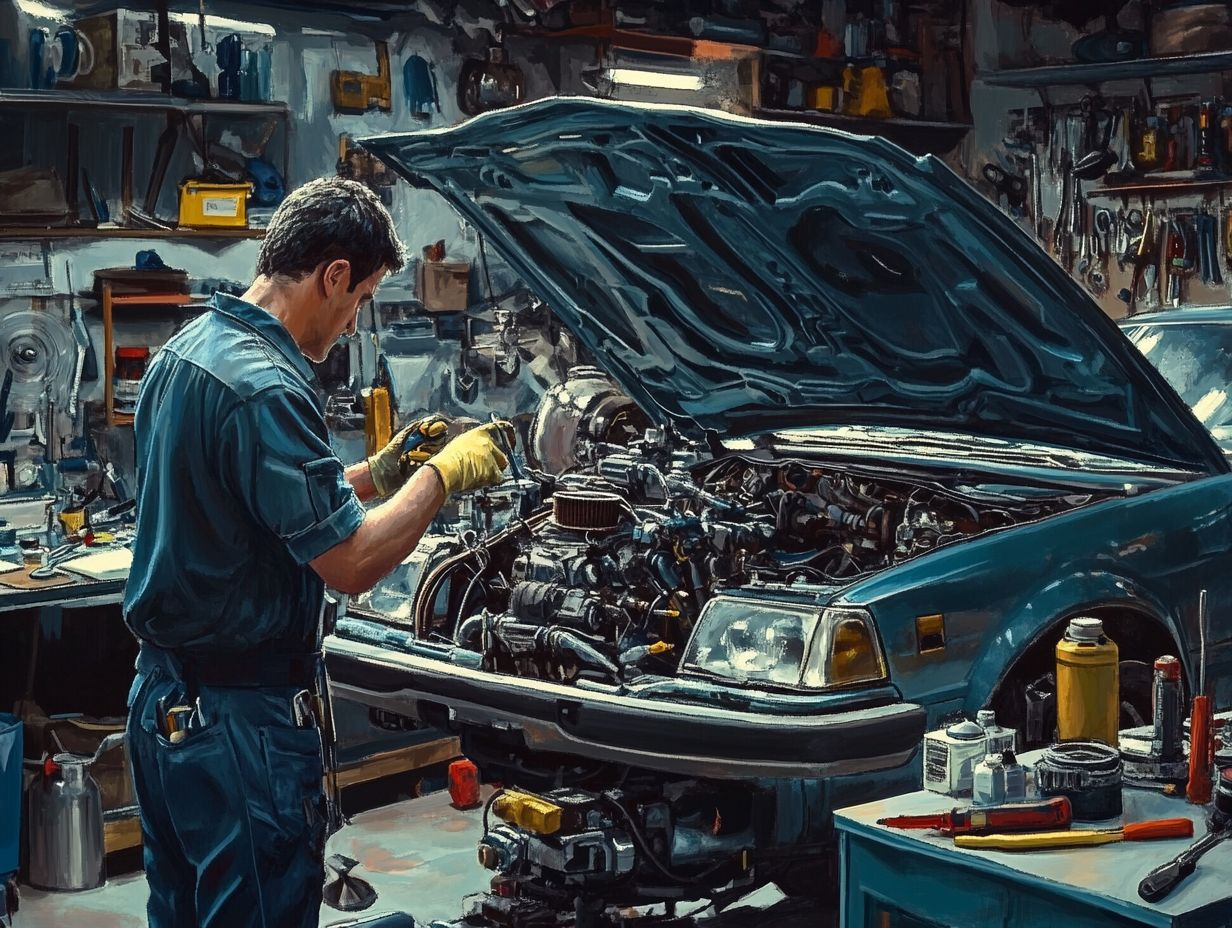
Establishing a regular maintenance schedule is essential for you as a car owner. It determines how frequently your vehicle should be serviced based on mileage and specific tasks like oil changes, brake inspections, and fluid checks.
By taking into account factors such as your vehicle’s age and the car maker’s instructions, you can craft a customized plan that aligns with your needs. Regular maintenance helps identify potential issues before they escalate and enhances your vehicle’s performance while ensuring safety on the road.
Neglecting the recommended intervals could lead to decreased efficiency, increased wear and tear, and possibly costly repairs in the future. Therefore, establishing an effective maintenance schedule is more than just a chore; it s a commitment to preserving your car s integrity and value.
What Are the Most Important Car Maintenance Tasks?
Identifying the most crucial car maintenance tasks is essential for ensuring your vehicle’s safety and performance. Key responsibilities include regular oil changes, tire maintenance, and brake inspections. For those looking for additional help, consider these quick fixes for common car issues; they form the backbone of effective vehicle upkeep.
When you consistently perform these tasks, you enhance your vehicle’s longevity and prevent unexpected breakdowns. For example, aim to change your oil every 3,000 to 5,000 miles. This practice lubricates your engine and helps reduce wear and tear.
Tire rotations and pressure checks should be on your agenda every 6,000 to 8,000 miles to ensure even tread wear and optimal fuel efficiency. Conduct brake inspections at least once a year. Neglecting this can lead to severe safety issues, such as a loss of braking power, which could result in costly repairs and serious accidents.
Make it a priority to stay on top of these maintenance tasks to safeguard both you and your vehicle. Understanding how to avoid common DIY maintenance mistakes can help you achieve this.
How Can a Car Owner Stay on Top of Maintenance?
You can stay ahead of maintenance by employing strategies like setting up maintenance reminders, scheduling routine inspections, and maintaining clear communication with your mechanic regarding your vehicle’s upkeep and repair needs.
In this digital age, numerous tools and apps can provide you with convenient reminders for oil changes, tire rotations, and other essential services. This ensures that nothing slips through the cracks. Embracing these digital solutions simplifies your maintenance routine and helps you maintain a comprehensive service history, which can significantly enhance your vehicle’s longevity.
Building a good relationship with your mechanic can make a world of difference. It facilitates open discussions about necessary repairs and maintenance options. Understanding the differences between dealer repairs and independent shops helps you make better choices without sacrificing quality.
What Are the Benefits of Regular Car Maintenance?
Regular car maintenance brings a wealth of advantages, including improved vehicle performance, enhanced fuel economy, increased safety, and extended longevity. These factors work together to significantly reduce your overall repair costs over time.
The Automotive Service Association reveals that sticking to a regular maintenance schedule can cut the chances of breakdowns by as much as 50%. Imagine the peace of mind that comes with that knowledge. By ensuring your vehicle receives timely oil changes, tire rotations, and brake inspections, you re not just promoting a safer driving environment; you re also bolstering your car s reliability on the road.
This proactive strategy minimizes unexpected repair bills and instills confidence in your vehicle’s performance. Whether you’re navigating daily commutes or embarking on long journeys, you can do so with assurance, knowing your investment is well-protected.
Frequently Asked Questions
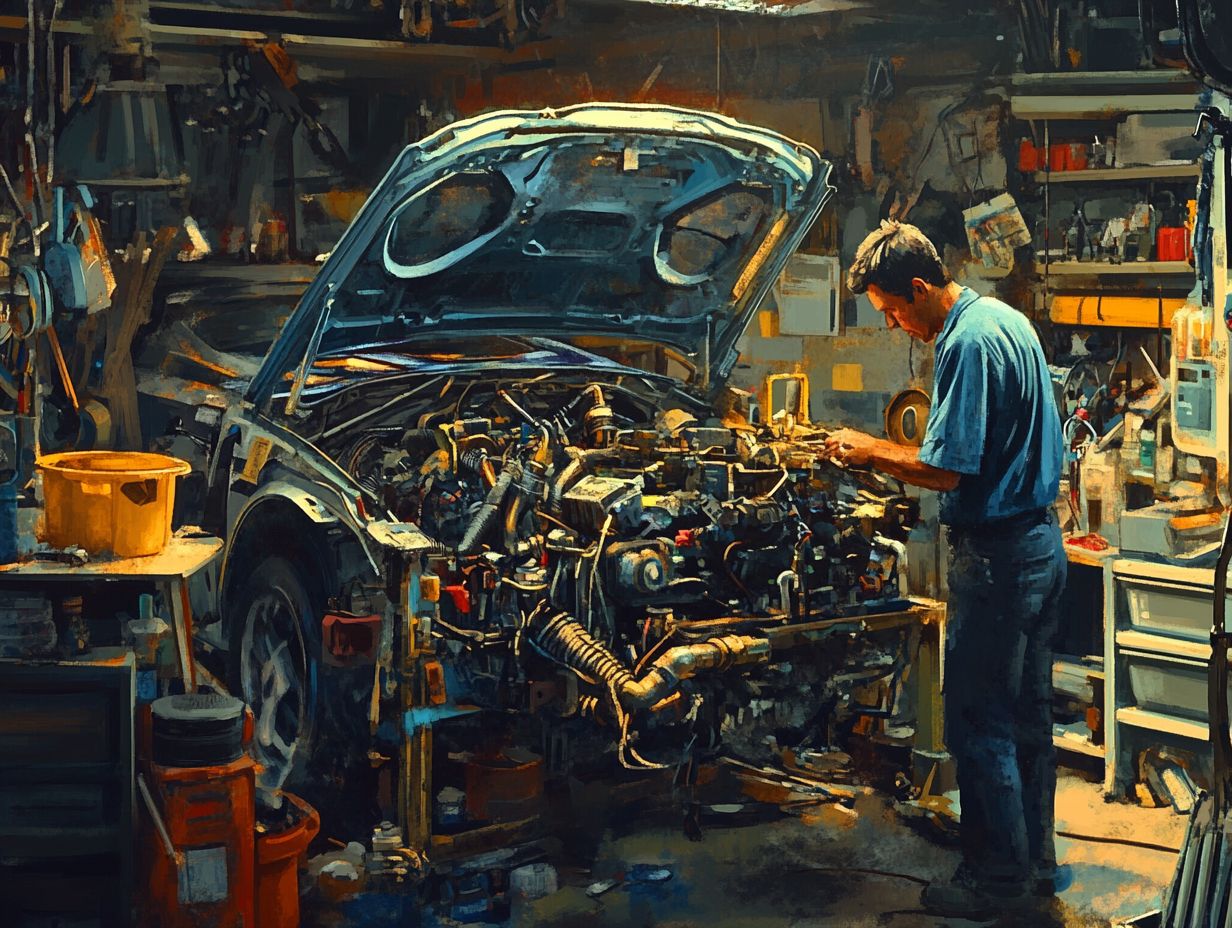
What are the 5 common car maintenance mistakes to avoid?
The 5 common car maintenance mistakes to avoid are:
1. Ignoring warning lights.
2. Not changing the oil regularly.
3. Neglecting tire maintenance.
4. Skipping routine check-ups.
5. Postponing necessary repairs.
Why is it important to pay attention to warning lights?
Warning lights on your car’s dashboard indicate a potential issue that needs to be addressed immediately. Ignoring warning lights can lead to major and expensive repairs down the line. Don t wait! Addressing warning lights right away can save you from major repair costs later!
How often should I change my car’s oil?
It is recommended to change your car’s oil every 3,000-5,000 miles, depending on your vehicle’s make and model. Neglecting oil changes can lead to engine damage and decrease the lifespan of your car.
Why is tire maintenance important?
Tires are the only point of contact between your car and the road. Neglecting tire maintenance like ensuring proper inflation and changing the position of your tires to ensure even wear can lead to poor handling, decreased fuel efficiency, and even accidents.
Do routine check-ups really make a difference?
Yes, routine check-ups allow for early detection of potential issues. This can save you from costly repairs in the future. Following your car’s maintenance schedule can save you from headaches and expensive repairs!
Is it safe to postpone necessary repairs?
No, it is not safe to postpone necessary repairs. Ignoring small problems can lead to bigger and more expensive issues and can put your safety at risk while driving.


